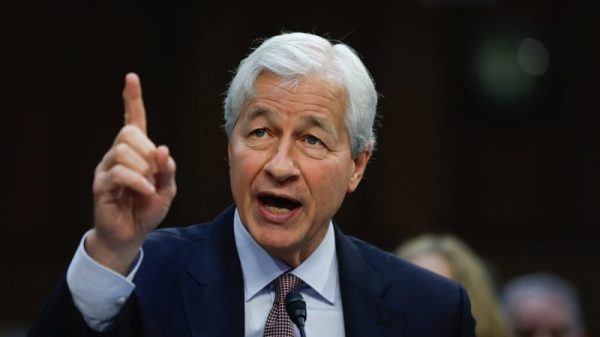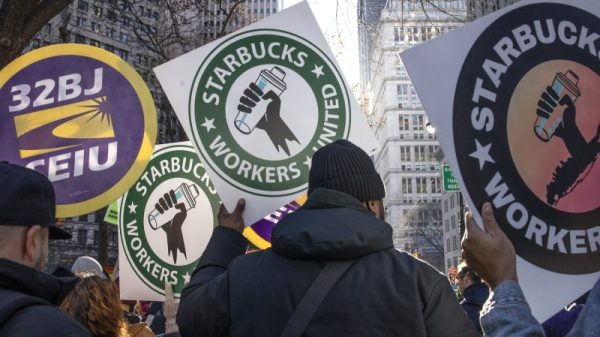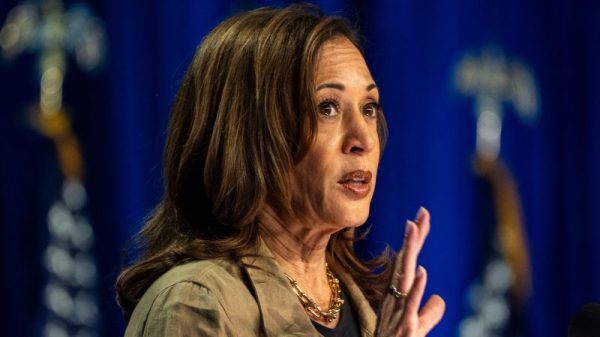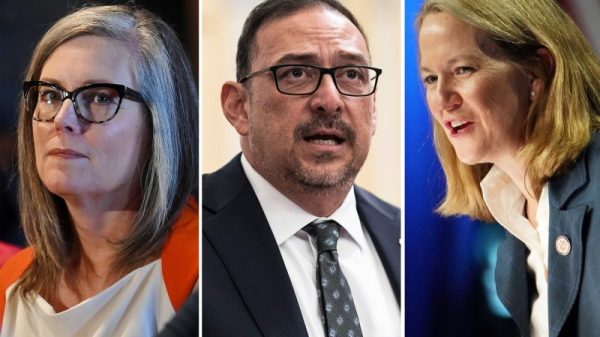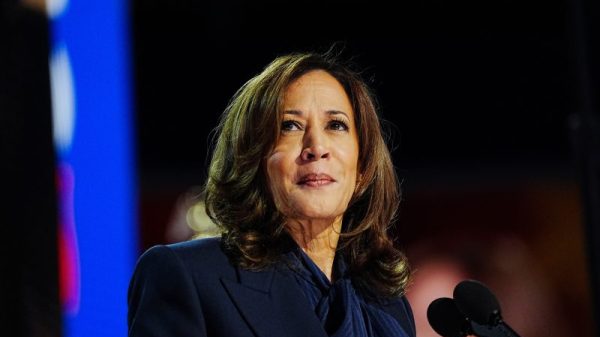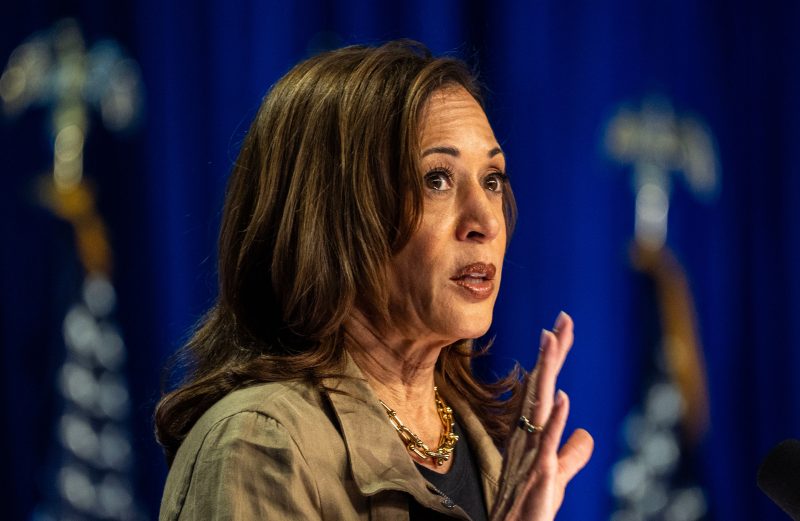
Vice President Kamala Harris continues to flesh out her policy agenda, addressing in recent days both economics and border security, two areas where voters have negative views about the work of her and President Joe Biden’s administration. The contrasts with former president Donald Trump are great, though that might not be what decides the election.
Trump’s policies are shaped by a dark view of the world, one that says America is a failing country that has been taken advantage of by other nations. His core economic proposal would impose significant tariffs — 10 percent to 20 percent — on foreign goods. Trump says other countries would pay the cost and that it would bring trillions to the federal treasury.
Many economists say that’s not how this works, that those tariffs would be passed along to American consumers through higher prices and also would reduce gross domestic product. Trump also has made unrealistic predictions that if he is elected, Americans would quickly see higher personal incomes and the rapid elimination of federal deficits.
Harris has packaged her economic agenda under the theme of an “opportunity economy,” not “Bidenomics,” which the president struggled to sell to voters. It includes both specific proposals — among them an enhanced child tax credit, assistance for first-time home buyers and new small businesses, and higher taxes on corporations — as well as some vague promises like cracking down on companies that engage in price gouging. She wants voters to know she recognizes their concerns about high prices and that she identifies closely with middle-class families.
On immigration, the two candidates are perhaps even further apart. Harris traveled to the U.S.-Mexico border in the battleground state of Arizona on Friday to address the issue, a significant vulnerability for her. Border crossings have been reduced this year, but because Biden was slow to act to stem the flow of migrants, her approach to this issue remains largely defensive. Voters see Trump as better equipped to deal with it. Her goal is to persuade voters she would take seriously the need to control illegal immigration.
Harris’s immigration policies include support for a bipartisan bill designed to toughen border security that Trump deep-sixed when it came up in the Senate (legislation that is not likely to be raised in the next Congress). On Friday, she pledged tougher restrictions and enforcement than exist under Biden. Her critics will ask why she didn’t make this happen earlier in the administration. Also, in perhaps the most direct contrast to Trump, she continues to favor legislation that ultimately would include a path to legal status for the millions of undocumented immigrants now in the country.
Trump has stayed on offense on immigration, which is his go-to topic, not to offer solutions so much as simply to stir up his base. Though there is agreement across the political spectrum that the current immigration system needs fixing, Trump has resorted to exaggeration and lies to heighten public alarm and shape public perceptions largely for political gains.
He has said falsely that migrants are eating pets in Springfield, Ohio, a claim repeatedly debunked by local officials. He has said falsely that foreign governments have emptied out prisons and asylums and sent those people to the United States. He and other Republicans say that there is a serious problem in this country of voting by undocumented immigrants, for which there is no proof.
The first two planks of the 2024 Republican platform say that Trump would “seal the border and stop the migrant invasion” and “carry out the largest deportation in American history.” Even when he was president, the border was not sealed, and analysts see the call to deport the millions of undocumented immigrants now in the country as impractical, punitive and possibly illegal, as he has said he would override the law prohibiting the use of the military against civilians.
Comparing the two candidates on these issues comes with caveats. Trump’s campaign is not, fundamentally, about policies. It is about grievance, retribution and division — and about him and his aspiration to be a strongman exercising unfettered power. He has offered white papers on many issues, but he’s run away from the most comprehensive policy blueprint available for a second Trump term, which is the extremely conservative Project 2025. Trump can’t say what he thinks about some important issues and has never been a student of policy.
In his debate with Harris earlier this month, he was asked whether he has a health-care plan to replace the Affordable Care Act. He said he had “concepts” and that a plan would be forthcoming “in the not-too-distant future.” He has been promising that for most of the past eight years without ever producing it — just as he promised “infrastructure week” that never materialized during his presidency.
A few weeks ago, he delivered what was billed as a major economic address. He could not have shown less interest in the substance. When he got a question from the audience about whether he had a specific policy to deal with the high cost of child care, he seemed flummoxed. He gave a meandering response, and his only proposed solution was a suggestion that he could take some of the money that he said would be generated by his tariffs and use it for child-care costs. That money likely would be as real as the money he said would come from Mexico to build his border wall but never materialized.
Throughout the campaign, voters have judged Trump to be more capable of handling the economy than either Biden or Harris. Recent polls indicate that Harris has cut into that advantage but there is more work to do, as Trump seeks to paint her as dangerously liberal and out of touch with the high prices of groceries and other goods.
In her speech last week in Pittsburgh, Harris described herself as a capitalist, a believer in free markets, a pragmatist and someone who is not tied to ideology. This is an effort to counter Trump’s claims that she is a doctrinaire California liberal whose policies would reflect that. She has not been closely associated with the Democratic Party’s most liberal wing, but as a candidate for president in the 2020 election, she drifted leftward, embracing various policies — an end to private health insurance, a ban on fracking — that she says she no longer supports.
As the 2024 Democratic nominee, her policies align with those of the administration in which she has served. In trying to carve out an identity separate from Biden’s and to play on the theme that she would turn the page on the past, Harris has taken some steps to differentiate herself. For instance, she would raise capital gains taxes, just not as Biden proposed.
Harris has issued an 82-page document about her economic plans that is available on her website. But in her small number of interviews with journalists, she has deflected questions about the details of her proposals, preferring broad strokes to a discussion of specifics and what-ifs.
She was asked by MSNBC’s Stephanie Ruhle last week about her plan to raise corporate taxes and what would happen if the next Congress resisted. How, then, would she pay for the proposals? Harris’s response: “We’re going to have to make sure that the biggest corporations and billionaires pay their fair share. That’s just it.”
Ruhle pressed Harris about the proposal to ban price gouging. “How do you go after price gouging without implementing price controls?” she asked. Harris responded without answering directly, saying, “So, just to be very frank, I am never going to apologize for going after companies and corporations that take advantage of the desperation of the American people… Yes, I’m going to go after them.”
Harris has been critical of the tax cuts that Trump enacted as president, which favored the wealthiest Americans. Those tax cuts are due to expire late next year. Ending the tax cuts for individuals would raise an estimated $4.6 trillion between 2025 and 2034, according to the Congressional Budget Office. Trump has said he would extend those cuts. Harris has not been specific about what she would do, other than to say no one earning less than $400,000 would see their taxes increase.
Harris is under greater pressure to outline her positions, because she’s less well-known than Trump and voters want reassurance about what kind of president she would be. To the degree she can assuage concerns of voters still looking for answers, she will position herself to win. But in the end, the choice for most voters will not be side-by-side comparisons on the issues but rather assumptions of whether the country would be saved or endangered by another four years with Trump in the White House.






